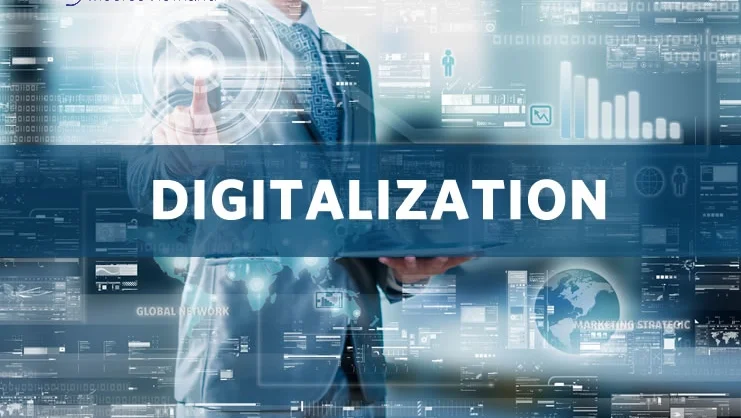Digitization effecting business in future
In today's business world, digitalization has shown to be almost necessary for success. It occurs when a company begins to use digital technologies to alter its business model and create new value-generating opportunities.
•
April 20, 2022

In today's business world, digitalization has shown to be almost necessary for success. It occurs when a company begins to use digital technologies to alter its business model and create new value-generating opportunities.
It's sometimes confused with digital transformation or digitization, but the two are vastly different.
What is digitalization?
The use of digital technologies to modify a business model and generate new revenue and value-producing opportunities is referred to as digitalization.
We might say it encompasses all activities and processes enabled by digital technologies. Many businesses have prospered as a result of digitalization.
Businesses have fully embraced digital technologies, from automating marketing efforts to processing orders.
In business, digitalization helps to increase the efficiency of operations by allowing for automation. Due to the reduced requirement for human resources, there are less human errors and lower operational costs.
To properly comprehend digitalization in business, we must first comprehend the function of technology in the process.
Transitioning from old analog to digital, digital technologies have reshaped the entire corporate landscape. Data is now saved on the cloud rather than on physical storage devices, guaranteeing that there are no data silos.
Effects of digitalization on sources of knowledge
We now have access to a plethora of experience and knowledge thanks to digitalization. Every business must be aware of knowledge that exists outside the traditional bounds.
Companies should understand how to bring collaborative groups together in a way that contributes to both the development and generation of surplus economic value.
It's critical to understand not just how to build relationships with external groups, but also how and when to capture value when it comes to owning and controlling process pieces.
Overall, digitization allows a diverse set of individuals to collaborate, bridging the gap between IT and non-IT departments and changing the way firms generate value.
Advantages of digitalization in business
- Allows for data analysis.
- Human errors are reduced.
- All operations have become more efficient.
- Data storage on the cloud is safer, which means lower operational costs.
Workflows are getting more simplified as a result of the adoption of digital technologies, and there are less human errors. Thanks to these optimized workflows, all procedures are carried out more efficiently, allowing firms to save operational costs.
Business digitalization has a huge impact on innovation. As technology advances, you are simply forced to act and create.
It's also difficult to stop once you get started. You will be more aware of new trends and opportunities if you continue to innovate.
Digitalization vs. digitization
Simply put, without digitization, digitalization isn't possible.
The conversion of data from analog to digital formats is referred to as digitization. Digitalization, on the other hand, refers to the use of digital technologies and data to generate new value and change how customers and businesses interact.
Digitalization, on the other hand, is primarily concerned with internal process optimization, such as job automation and paper reduction.
Digitalization vs. digital transformation
Despite the fact that digitalization is frequently used interchangeably with digital transformation, the two words are vastly different.
The term "digital transformation" refers to a much broader application of digital technologies as well as a shift in culture. It has less to do with digital technologies and more to do with humans. It necessitates fundamental organizational reforms that are endorsed by leadership.
It focuses using digital technologies to empower people in order to improve the business culture.
Related

Technology and Automation in Accounting and Auditing: Adapting to a Digital-First Future
The world of accounting and auditing is being reshaped by cutting-edge technologies, bringing opportunities and challenges for professionals and businesses alike. From blockchain to artificial inte...
Read more
Financial Reporting and Analysis in 2024: Key Updates You Need to Know
Financial reporting today isn’t just about crunching numbers; it’s about telling the full story behind a company’s performance, future potential, and impact. With new standards emerging, evolving a...
Read more
Navigating the Evolving World of Audit and Assurance
The world of auditing is not what it used to be—it's faster, smarter, and more focused on risk and fraud than ever before. With new technologies and methodologies reshaping how audits are done...
Read more